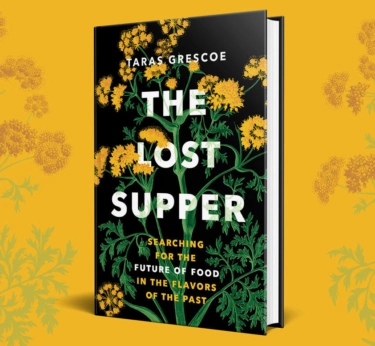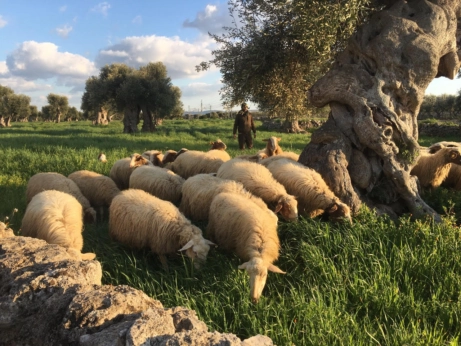
[ad_1]
The next is excerpted from Taras Grescoe’s The Misplaced Supper, and has been frivolously edited for size and readability.
There have been instances throughout this voyage that it appeared humanity was driving down an alley towards a brick wall, quick. Disaster loomed in all places I seemed: within the mud bowls on the once-fertile plains of central Turkey, within the vanishing lakes of Mexico Metropolis, within the fetid cesspools exterior the manufacturing unit farms of North Carolina, within the disease-ravaged olive timber of Puglia, within the speedy wiping away of numerous meals webs in each biome. The demographers’ state of affairs, the place we’ll have to provide 50 p.c extra meals by midcentury to feed a inhabitants of ten billion or face famine, generally appeared like the one doable final result.
In the meanwhile, our crafty plan appears to be to attend till the final second and hope an airbag will deploy to cushion us from the ultimate affect. In trendy instances, there’s a protracted custom of techno-optimists or cornucopians–science author Charles C. Mann calls them “wizards”–telling us that know-how will come to our rescue. Within the Nineteen Thirties, Winston Churchill predicted within the pages of a Canadian journal that future famines could be averted by elevating edible micro organism in underground cellars utilizing synthetic radiation. Others noticed yeast factories and transcontinental algae pipelines nourishing the domed metropolises of the twenty first century.
Based on the techno-optimists, hacking photosynthesis by genetically modifying rubisco, the enzyme present in all crops that flip daylight and carbon dioxide into starches, proteins, and different vitamins will enable us to radically improve rice yields in Asia. Rising perennial grasses, reasonably than annuals like wheat, will allow us to mow the cereals we eat reasonably than chopping them down entire, thus retaining root programs intact and placing an finish to soil degradation. Utilizing robots to take advantage of cows and drones for the precision irrigation of crops will save labor prices and preserve water. And rising meat within the lab, from cultured stem cells in bioreactors will remove the necessity for elevating livestock, and all of the environmental havoc that goes with it.
A better look, although, exhibits that almost all of those techno fixes have critical downsides. Perennial wheat, marketed as Kernza, doesn’t have sufficient gluten to make bread or pasta; robot-milking programs don’t enable for pasture feeding, requiring cows to stay in barns year-round for the system to be worthwhile. Enterprise capitalists have poured $3 billion into the lab-grown meat trade, but the ensuing merchandise need to be bulked up with plant protein, and are nonetheless removed from palatable. As for Churchill’s plan to lift micro organism in caves, it’s again within the type of journalist George Monbiot’s plan for curing “agricultural sprawl” and feeding the billions: energy will as soon as once more be plucked out of the air, as Scandinavian labs use electrical energy and “precision fermentation” to rework micro organism into grey protein pancakes.

My response to the techno-optimists and wizards who inform us that we should always all subsist on a weight-reduction plan of micro organism, yeast, cultured meat, or algae is: you go first. And by that I don’t imply take the primary chew. (As an adventurous eater. I’ll strive something as soon as.) I imply, present me that you would be able to survive and thrive on that weight-reduction plan for 5, ten, or 20 years. Then I’d contemplate becoming a member of you.
I’ve observed one thing about “scientifically improved” meals. To place it bluntly: no person desires to eat that shit. The primary accepted transgenic vegetable, the slow-ripening rot-resistant Flavr Savr tomato, engineered with genes from a bacterial parasite, was a industrial flop, dropping hundreds of thousands for the corporate that developed it. Golden rice, engineered to comprise larger ranges of beta-carotene, and the Arctic Apple, designed to not brown when reduce, have additionally failed to draw farmers and customers.
It seems that what folks do need to eat once they’re given any sort of alternative, and are capable of afford it, is non-GM meals. The marketplace for natural meals, which has greater than doubled in a decade, accounted for $58 billion in gross sales in 2021 in america alone.
If we’re actually critical about forestalling famine, we have to cease feeding a lot grain to livestock, and save the wheat, corn, and rice we develop for human consumption. Edible bugs are already getting used to feed poultry and farmed fish, however they is also included within the feed of cattle and pigs. The black soldier fly is an environment friendly, quick rising converter of natural waste into protein for animal feed. I interviewed Kieran Olivaraes Whitaker, the founding father of the British firm Entocycle, who has succeeded in elevating hundreds of thousands of flies in a tiny rented house within the middle of London. The solely automated operation used the waste from breweries to feed the bugs; the black soldier flies can be utilized to spice up the protein content material in feed for cattle, poultry, pigs, and farmed fish. This method makes much more sense to me than hoping people will all of the sudden purchase a style for bug-burgers.
However elevating bugs for feed is a patch, not an answer. The Meals and Agriculture Group of the United Nations has made it clear that in the meanwhile, meals producers pump out sufficient energy to feed all people on Earth. It’s equally clear that the billions of inhabitants of the “World South” aren’t the issue. It’s the folks on the planet’s wealthy nations, in addition to the rising center courses in Asia, Latin America, and Africa, who devour diets excessive in processed meals and grain-fed meat and dairy that preserve us hurtling towards that brick wall.

Puglia, in southern Italy, taught Grescoe about each olive timber and the traditional custom of shepherding. Picture submitted.
Within the ultimate months of penning this guide, I used to be fortunate sufficient to spend just a few weeks surrounded by wheat fields. I used to be staying within the foothills of the Jura Mountains, within the canton of Vaud, part of Switzerland that prides itself on sustainable natural agriculture. Lots of the farms have been centuries outdated. The complete panorama appeared dedicated to turning the richness of the soil into fantastically scrumptious meals. I witnessed the age-old transhumance, during which Simmental, Jersey, and Charolais cows have been transported to summer season pastures in alpine meadows greater than 4,000 toes in altitude, the place they consumed wild flowers and luxurious grass to provide the beautiful Gruyère, Tomme, and Vacherin cheeses bought in village fromageries.
I’d arrived in mid-Could, simply because the reddish-orange poppies have been blooming. On day by day bike rides, I obtained to see the spring wheat planted in fields throughout me mature from a lustrous inexperienced to a sharkskin amber. I recalled the criticism leveled towards wheat: that it’s one in every of humanity’s most egregious examples of a monocrop. However within the Vaud, the fields have been comparatively small, just a few dozen acres at most, and other people have been cautious to plant fruit and nut-bearing timber alongside the perimeters. A neighborhood initiative had dotted jachères, richly numerous plots of native grasses and wildflowers that inspired birds to nest and bugs to collect pollen, in random spots among the many wheat fields.
Being in Switzerland was a reminder that agriculture needn’t be the issue. Executed correctly, it was the answer to our range and sustainability disaster. There was a world of different nice practices on the market, generally known as regenerative farming, biointensive agriculture, agroforestry, or permaculture, just like the combined mountain farming champion Sepp Holzer, an Austrian advocate of farming on marginal land.
Even when we aren’t ready to develop our personal meals, there are simple methods we will all develop into accountable eaters. The poet and essayist Wendell Berry laid out seven rules in his influential 1989 essay “The Pleasures of Consuming.” Put together your personal meals; be taught the place the meals you purchase comes from; deal immediately, each time doable, with native farmers, gardeners and orchardists. In self-defense, educate your self concerning the financial system and know-how of meals manufacturing and the way trade provides to and alters meals. Be taught what’s concerned in one of the best farming, in addition to within the life histories of meals species. At first, take part in meals manufacturing, even when which means nothing greater than rising herbs or tomatoes on a kitchen windowsill.
In Switzerland, I remembered the wheat fields I’ve recognized on the Canadian Prairies and the Nice Plains, which may cowl 30,000 acres, so huge that strolling from one edge to the opposite can take three hours. Planted with dwarf hybrid varieties, sprayed with pesticides, and shocked useless with glyphosate for simpler harvesting by combines, this was the sort of landscapes the critics of business agriculture decry: one devoid of range, useless apart from the one plant species that occurs to be valued by trendy people: wheat. It was a stark distinction to the Swiss countryside, the place agriculture was practiced in a manner that stored the soil wholesome, and the land and air alive with animal, plant, and bug life.
If people are outlined because the species that adapts to new environments, we’ve fulfilled our future to the extent that we now discover ourselves tailored to impoverished environments solely of our personal making. The monocultures of wheat, rice, corn, and soybeans that feed us rely for his or her success on the elimination of biodiversity. However range is what confers resiliency, and by simplifying pure habitats to serve the wants of business agriculture, we’ve left ourselves open to pandemics, supply-chain-disrupting wars, droughts, floods, and new crop and livestock ailments. Our willpower to feed everybody on the planet cheaply has already resulted in malnourishment for the plenty. If we don’t change our methods, it might quickly result in starvation for all.
Taras Grescoe is a Montreal-based journalist and writer. He’s the writer of Straphanger, Bottomfeeder, and The Satan’s Picnic. He writes concerning the historical past of meals on lostsupper.weblog.
[ad_2]